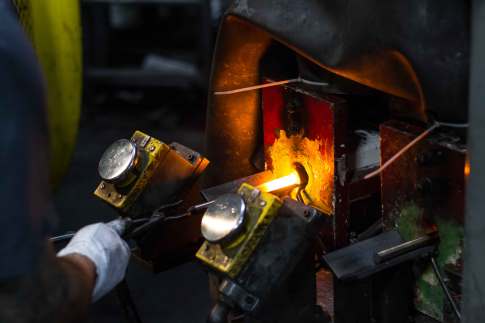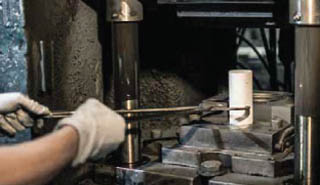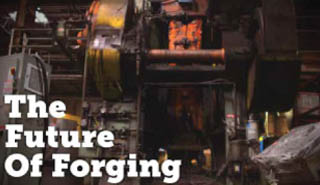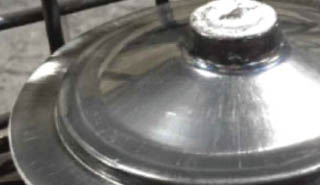Versatile, strong, and resistant to heat and corrosion, forged stainless steel can be used in a myriad of settings and industries, including manufacturing, construction, healthcare, transportation, and more. Whether you need stainless steel rebar couplers, forged pipe fittings, or a different metal component, Queen City Forging has the expertise and experience to deliver a high-quality product at cost-effective prices.
Request a quote, give us a call, or learn more about forging stainless steel below.
Why Industries Use Stainless Steel Forgings
The manufacturing, construction, mining, transport, engineering, and health industries all have the use of stainless steel forgings in common. Stainless steel is suitable for a wide range of industrial applications and is one of the most versatile steel alloys.
Stainless steel forgings have the strength of carbon steel, but with superior resistance to heat and corrosion. Additionally, stainless steel forgings are suitable for use in many different settings, including high-pressure and sanitary applications.
Forged Stainless Steel Capabilities
Stainless steel has several capabilities that make it the material of choice in the production of forged metal components. The forging process refines the grain flow of stainless steel, which enhances the alloy’s capabilities. View the key capabilities of forged stainless steel below.
- High corrosion resistance makes stainless steel forgings ideal as components in pumps and marine, chemical, and petrochemical equipment.
- The ability to withstand high levels of pressure and stress allows for optimal performance in systems such as motor components and landing gear.
- Stainless steel forgings have a high heat resistance suitable for parts in furnaces and ovens.
- High levels of tensile strength and stability make stainless steel forgings ideal as structural components of various systems.
- Because stainless steel forgings can withstand frequent cleaning, the food and health industries incorporate them into their operations.
Stainless Steel Forged Fittings
Learn More About the Different Types of Fittings and Why They Are Used.
Stainless Steel Forged Pipe Fittings
Learn More About The Different Stainless Steel Forged Pipe Fittings
Stainless Steel Rebar Couplers
Learn About the Benefits of Quality Rebar Necessary for Construction Projects.

Forged Stainless Steel Advantages
We implement a highly refined forging process to ensure that our clients derive optimal benefit from their stainless steel forging. The process consists of several steps, including raw material procurement, a variety of heat treatment methods and final inspection.
We recommend 300 series or austenitic stainless steel such as 304, 304L, or 316 to ensure optimal results at reasonable costs. However, if you require unique features, we may recommend the stainless steel of a different grade. The steel forging process offers similar advantages for all types of stainless steel.
Protective Oxide Layer
Through the thermal process a protective oxide layer forms around the component that enhances its corrosion resistance, protecting it against a harsh environment. Another process to resist corrosion is passivation, which removes any free iron from the surface, creating a more chemically resistant surface.
Undergoing the forging process reduces risks to the stainless steel forging component for:
- Stress cracking
- Crevice corrosion
- Pitting
Ultimately, forging extends the functional lifespan of stainless steel components and ensures a reliable, cost-effective system operation.
High Corrosion Resistance
Stainless steels generally have inherent corrosion resistance because of a thin oxide layer on the steel’s surface. As a result, the surface of a forged stainless steel part is electrochemically passive, even in corrosive environments.
Most industrial settings require forged stainless steel components to reduce susceptibility to corrosion. As a result, exposure to water, chemicals, and petrochemicals don’t affect the functionality of the part, nor does it reduce its lifespan.
High Heat Resistance
Forging retains all the inherent advantages of stainless steel as an alloy. By maintaining and redirecting the internal grain flow, forging also enhances the service thermal performance of a stainless steel component. These properties make the components suitable for integration in high-temperature systems such as furnaces and heat exchangers.
Stainless Steel Inventory
Queen City Forging is a leading provider of various standard stainless steel grades to meet our clients’ project specifications and requirements. The inventory we source includes:
- 300 series stainless steel, including 303, 304/304L, 316/316L, 317, and 321
- 400 series stainless steel, including 410, 420, 440C
- Precipitation hardening stainless steel, including 13-8 VIM/VAR, 15-5 VAR, 17-4
- Nitronic stainless steel (50, 60)
- Stainless steel grades such as A182F51 (2205), A182F6NM, custom 450 ESR[H2]
If your project requires a unique stainless steel inventory, for example, 200 or 600 series, we can also suggest and supply a suitable stainless steel grade.
FAQ’s
Can you forge with stainless steel?
Stainless steel forging results in a uniform grain flow and distribution that follows the contour of the component contributing to the alloy’s inherent strength, heat, and corrosion resistance.
What does forged stainless steel mean?
The manufacturing process of forged stainless steel products is shaping with localized, compressive forces. There are several forging methods for stainless steel, including open die forging, closed die forging, and upset forging.
Can 300 series stainless steel be heat treated?
A typical steel heat treatments doesn’t harden 300 series stainless steel. Solution treating or annealing this stainless steel is possible by heating it to 1010 – 1120 °C before rapid cooling. Slow cooling 300 series stainless steel retains its hardness; where as rapid cooling softens the steel.
Need a Stainless Steel Forging?
Queen City Forging produces stainless steel forgings for a variety of industries, including transportation, food and health, construction, and more. A leader among U.S. forging companies for more than a century, we have the expertise and experience to produce high-quality stainless steel forgings with the strength, durability, and corrosion resistance you need. Request a quote today.












